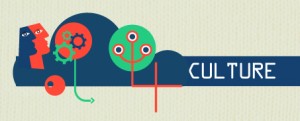
Most organizations boast of having a culture. And no one is wrong when they do so, because every organization does have a unique identity and a way its employees perceive that identity. Organizational Culture, as defined on businessdictionary.com, is “the values and behaviors that contribute to the unique social and psychological environment of an organization”.
Removing all the jargon from this definition, what it really boils down to are some basic questions. What does the organization believe in? How does it react to employees who may not share the same beliefs? Do the employees feel proud and happy to work for the organization? Or is it one long dreary engagement between two unlikely entities?
So much has been written on organizational culture and matching the employee and the organization and so on and so forth, yet we find a high number of dissatisfied, disgruntled and positively unhappy employees around us in this corporate world. So here are some of my yardsticks to evaluate or understand an organization’s culture – looking in from the outside. Starting from the first job these yardsticks are valid and have value in every transition made.
1. The Start
There was once an interview I attended where the interviewer questioned me for about 45 minutes. When I stepped out I felt like I had just committed a felony and had been interrogated instead of being tested for my knowledge on the relevant subjects.
Many companies approach the interviewee with the idea of stressing them out, purportedly to understand the individual’s capability. However, my view on this has always been that jobs in the corporate are not ‘life-endangering’ and ‘constantly under stress’. Compare a job in marketing or finance to one in a hospital- as a surgeon or a nurse. People quite literally perform under stressful conditions there! However in business you have time to evaluate your options to approach a problem in the best way possible, especially jobs at entry and mid-level. So the concept of stress interviews never has made sense to me.
2. The People
When you walk in through the door, you notice a lot of small little things- the décor of the office, the arrangement of cubicles, a professional air around the place and so on. Yet, to me, the most important and palpable vibe comes from the people. When you sit down and the interviewer asks you if you’d like a glass of water, you know they think a little beyond themselves. Trivial and obvious as it may sound, there are many places where the interviewer may dispense with this or other cursory politeness. This for me is a no-go. The demonstration of care begins from minute one. Because culture is not something that begins when you join or stop when you leave – it is the cumulative effect of many such small behaviors.
3. Scope to Learn
Unless you are at the point of retirement, every job will have a learning curve. The biggest challenge for most organizations is to keep this curve steep for as long as possible. When evaluating a job, I believe, figuring out the organization’s attitude towards encouraging learning is critical.
If you choose to pursue a course to improve yourself, would the organization support the move? Would the job give you enough time at work to read up and research the latest in your field of work? Would it be viewed as something one should do on one’s own time? Answers to these questions would help in assessing the organization’s attitude towards enhancing your learning experience. And this is for me an integral part of the work culture.
4. Your Peers
Our experiences at our workspace are largely defined by our peers. How your colleague responds to you will essentially make up how you are going to behave in the organization. When your peers guide you, encourage you, and help you learn the ropes you know you have the right support system. Additionally if you can use them as sounding boards for great ideas and they respond to you, you know you have struck gold! What is important here is the fact that the organization is an eco-system comprising of you as well as others. The better you vibe, the better your experiences in the organization.
5. Your Boss(es)
This seems like a no-brainer in the organizational culture context. Statistics say that amongst the most common reasons people are looking to quit their jobs is the fact that they are dissatisfied with their bosses. They associate a plethora of problems linked to poor leadership. You can read some instances here. So what is seemingly obvious is for some reason not so obvious. When you join a organization you look for leadership and direction but on a more personal level, you look for challenging tasks, fulfilling work allocations and appreciation- all of which the boss will hand out. So often, organizations invest in building a culture and then fail in maintaining it because of a few bosses who believe otherwise! Culture is as great or weak as it is in the hands of your managers.
To some the above points may seem like the makings of an ideal and perhaps unrealistic work culture. But truly, culture-wise, there are many organizations today that are consciously investing in giving their employees the best they have to offer. Some offer work-life balance, while others offer a great work atmosphere, while still others offer great learning opportunities. When you see the right mix of some of these aspects; you can be sure that the organization has taken efforts to build its culture with great care.
If you lead an organization, you may want to relook at some of these points to take a reality check on what prospective colleagues read about your culture when they meet you.
Write in to us with your thoughts on building or evaluating culture, especially in start-ups and growing businesses. We think it is a very important aspect of building a sustainable organization. Which is why some of this will be discussed in our People panel on Inception Day on 1st June 2013. Read more about that here. For Event details click here: http://tinyurl.
About the Author:
Madhumita is a brand marketer known for her exuberance and zeal for getting things done. An MBA grad, Madhu started her marketing career at ITC and has been with IBS since mid-2012. She has contributed immensely to shaping some of our young client brands. She now supports us in her new role as Associate Consultant based in Connecticut, USA. Apart from her passion for brands & marketing, Madhu loves classical Indian dance, travel and writing.
Connect Madhu on LinkedIn.
or
or
Connect with her via email at madhumita@inception.net.in








